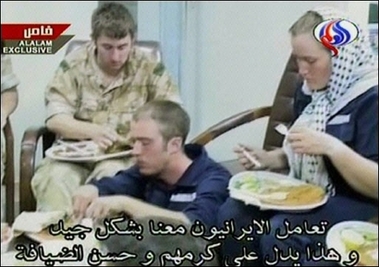Blair: Next 2 days with Iran are crucial
(AP)Updated: 2007-04-03 17:23
LONDON - The next two days are "fairly critical" to resolving the dispute over a seized British navy crew, British Prime Minister Tony Blair said Tuesday, after Iran's chief international negotiator offered a new approach to end the standoff with Tehran.
The British government responded to Ali Larijani by saying that both it and Iran had a "shared desire to make early progress" in resolving the dispute.
The quieter tone from both capitals Monday raised hopes the 11-day standoff might be solved soon. But optimistic signs emerged before, only to be followed by a hardening of positions and tough rhetoric.
"There remain some differences between us, but we can confirm we share his preference for early bilateral discussions to find a diplomatic solution to this problem," a British Foreign Office spokeswoman said speaking anonymously in line with government policy.
Iran's priority "is to solve the problem through proper diplomatic channels," Larijani told Britain's Channel 4 television news. "We are not interested in letting this issue get further complicated."
And he called for all involved to stop using "the language of force." Last week Larijani had suggested the captives might be tried for allegedly intruding into Iranian waters.
The Iranian capital, Tehran, was quiet Monday - a day after hundreds of students hurled firecrackers and rocks at the British Embassy, chanting "death to Britain" and calling for the expulsion of the country's ambassador because of the standoff.
Earlier Monday, an Iranian state-run television station said all 15 of the detained Royal Navy personnel had confessed to illegally entering Iranian waters before they were captured.
However, Iranian state-run radio said the confessions would not be broadcast because of what it called "positive changes" in the negotiating stance of Britain, whose leaders have been angered by the airing of videos of the captives.
The radio did not elaborate on the supposed changes by the British. But in London, a British official, speaking on condition of anonymity because of the sensitivity of the issue, said Prime Minister Tony Blair's government had agreed to consider ways to avoid such situations in the future.
The official insisted Britain was not negotiating with the Iranians and still wanted the captives freed unconditionally.
The eight sailors and seven marines were detained March 23 by naval units of the Iranian Revolutionary Guards while the Britons patrolled for smugglers near the mouth of the Shatt al-Arab, a waterway that has long been a disputed dividing line between Iraq and Iran.
Iran says the team was in Iranian waters. Britain insists it was in Iraqi waters working under a UN mandate.
Iran has previously demanded an apology from Britain as a condition for the sailors' release.
Echoing an Iranian legislator, Larijani suggested a British delegation visit Tehran "to review the case, to clarify the case, first of all - to clarify whether they have been in our territorial waters at all."
Over the weekend, The Sunday Telegraph of London said Britain was considering
sending a senior Royal Navy officer to Tehran to discuss the return of the
captives as well as to talk about ways to avoid future incidents.
| 1 | 2 |  |
|
||
|
||
|
|



